- Home
- Brian Falkner
The Real Thing Page 7
The Real Thing Read online
Page 7
‘Built to withstand a tornado all right. You’d need a battering ram to get through those.’
Fizzer was hardly listening. He was watching the way the long chain had dragged across the edge of the centre post when Tupai had moved to the doors, splintering and chipping the wood.
‘What’s holding up the roof?’ Fizzer asked.
‘A great, big post,’ Tupai said, in a kindergarten voice.
‘And if we took the post away?’
‘The roof would probably cave in and kill us.’
‘Or it might cave in and leave a big hole we could climb out of. And if we stayed by the walls we could probably avoid being crushed.’
‘Right,’ said Tupai cheerily. ‘So all we need is an axe.’
‘Or a band saw,’ Fizzer said quietly.
Half an hour later they had succeeded in knocking an edge off the post, about knee height. An hour later it had grown to a small indentation in the wood.
A chain does not make a very good band saw. Even so, by that night they had a groove about half a centimetre deep.
They took a dinner break at about six o’clock.
‘This is going to take forever,’ Tupai shook his head doubtfully, chewing over a mouthful of cold beans.
‘Got anything better to do?’
By the end of the third day the groove was a deep cut. Tupai had one end of the chain, and Fizzer the other. They sawed away at the post by pulling the chain back and forth between them.
Progress was faster on the fourth day. The chain now slotted into the cut in the wood, and they didn’t have to spend quite so much time or energy trying to keep it in position.
Two days after that, they were wholeheartedly sick of cold canned beans, but the post was cut almost to the middle.
‘You’d have thought they could have varied the diet a little,’ Tupai complained.
‘Hmm.’ Fizzer wrinkled his nose. ‘Give me a box of matches and we could blow our way out of here.’
It was about noon on the Monday, after more than a week of imprisonment, when Tupai decided he’d had enough.
‘I think I can break it,’ he said.
Fizzer looked doubtful. The post was only two-thirds cut.
‘If we push from the cut side,’ Tupai explained, ‘the weight of the post will help crack the timber on the other side. Then we push from the other side, and the weakened post should break.’
‘We’ll try it,’ Fizzer agreed. ‘What do I do?’
‘Put your shoulder into it.’
Tupai sat on the floor and placed his feet on the post, just above the cut. Fizzer put his shoulder against the post, a little higher.
‘Here goes nothing,’ he said.
The post creaked and cracked and bent, until the gap they had cut had completely closed. It would give way no more after that.
They changed sides and pushed back but, despite their best efforts, they could only move the post a couple of centimetres before it sprang back to where it was.
Fizzer looked doubtfully at the cut, now completely closed up again.
‘Maybe we should have waited a little longer,’ he said.
There was no accusation in his voice, just a simple statement of fact.
‘Sorry,’ Tupai said.
‘That’s all right mate, we’ll have a break now and make a new start in the morning.’ Fizzer sat down on his haunches and wiped his forehead with the back of his wrist. ‘Why is it so hard this way, when it was so easy the other way?’
‘I think it’s because we’re now pushing against the weight of the wood. I didn’t consider that before.’
Tupai sat down on the floor again and put his feet back up on the post. ‘Half the problem is that I’ve got nothing to push against. If my back was up against the wall, I’d push against that.’
‘I can be a wall,’ said Fizzer.
Tupai looked at him questioningly.
‘I can be a wall,’ Fizzer repeated with conviction. ‘It’s just mind over matter.’
‘Worth a crack,’ Tupai said, although he wasn’t sure that it was.
Fizzer sat back to back with Tupai and braced his feet against the wall of the cellar. ‘I’ll tell you when,’ he said.
Tupai rested his feet on the post and waited. Fizzer’s breathing began to slow. It was a kind of self-hypnosis. His back began to stiffen against Tupai’s. An aura of calmness settled around him. Fizzer was becoming a wall.
Finally, Fizzer said quietly, ‘Try now.’
Tupai braced his back against Fizzer’s, and it was just like bracing against a concrete block wall. Fizzer’s breathing continued, slow and measured, as it did when he was meditating.
Tupai’s legs flexed and rippled and the post began to move. The ‘wall’ behind him was as solid as rock. He closed his eyes and clenched his fists and the post moved further, and further, until there was a crack and the half cut joint gave way completely, the weight of the post pulling it out of the ceiling mount. It would have crashed down on top of them, if Tupai hadn’t deflected it with a powerful sweep of his arms.
It smashed into the side of the wall with a loud thud. Tupai helped Fizzer to his feet and they scanned the ceiling hopefully.
‘How’d I do?’ Fizzer asked.
‘Solid, mate,’ Tupai replied with affection. ‘Solid as a rock.’
Unfortunately so was the ceiling. Apart from a slight sag in the long beams and a small fall of earth from between some of the cracks, the ceiling looked as solid as before.
‘Well, it seemed like a good idea at the time,’ Fizzer began.
Tupai was looking at the fallen post. It was a solid square-cut piece of timber, hewn from a single log. Knotholes showed here and there down its length.
‘Do you remember what I said we’d need to open those doors?’ he asked slowly.
Fizzer nodded. ‘A battering ram.’ His eyes landed on the post.
It took just six blows to smash the timber beam that braced the doors from the outside, then Tupai shouldered one of them open and they emerged blinking into a blue dome world.
‘One more day living underground and I think I’d have gone mad,’ Tupai said.
Tupai had no intuitive ability at all, as far as he knew, but it turned out to be a strangely prophetic statement for all that, and one that he would live to regret. But that didn’t happen till much, much later.
THE UGLY BROTHERS
In the distance, beyond a fence and a grove of trees, they saw a mud track, probably the horse-training track they had heard being used on a number of occasions during their stay in the cellar. It was deserted now.
Tupai started to walk in that direction but Fizzer grabbed his arm and pointed to an axe, embedded in a stump, outside a nearby barn. A half-pitched haystack sat next to a long wooden-railed fence.
It took a single blow from Tupai to sever the short chain between Fizzer’s handcuffs, and just four from Fizzer to sever Tupai’s. Then, apart from a pair of iron bracelets each, they were free.
‘Now what?’ Tupai asked, but that question was answered for them as two young men, brothers by the look of them, came around the corner of the barn. The front one, the youngest, looked about eighteen. He carried a pitchfork and was obviously in the middle of doing something with the stack of hay.
They were about the same height, tall, with a lanky stride, and a flat-top, US Marines style haircut. Both wore the armless overalls Americans call dungarees. Neither would have carved out a successful career as a male model. Not by a long shot.
‘Uh oh,’ said the younger one, in a coarse southern accent that was chalk and cheese to the relaxed Atlanta drawl of the city dwellers. ‘Lookee like the rats is got outta the trap. Better sort that out afore Bobby gits ornery.’
His brother agreed. ‘It ain’t a good thang when Bobby gits ornery.’
Ugly Brother the Younger thrust the sharp end of the pitchfork at them as if fending off a wild animal. ‘Back in yer hole, rats, back in yer hole.’
The o
lder one laughed and the younger one grinned stupidly at them until Tupai took the pitchfork off him and broke it over his knee.
Just for clarification, he didn’t just hand over the pitchfork with a nod and a smile, although Tupai had asked him for it reasonably politely considering the circumstances. The young man sat down in the pile of hay he had been pitching, blood streaming from his nose, while Tupai snapped the end off the pitchfork and tossed the pole to Fizzer.
The older brother looked a bit shell-shocked at that, and he wasn’t the one who had been hit in the face with a power hammer, which is what Tupai’s fist must have felt like. Maybe he was shocked at the sight of someone breaking a pitchfork across his knee (which is not exactly easy to do).
‘Hell in a bucket, Curtis,’ the older one said. ‘What’d’ya let him hit yer fer?’
Curtis stood back up then, and, to use an American phrase, he was madder’n a cut snake.
Tupai stood still, clenching and unclenching his fists. You need to understand that Tupai had been learning the art of diplomacy over recent months. Frequently, he had found ways to avoid a fight, rather than charging in full throttle.
But he’d just spent a week and a bit in a storm cellar, eating nothing but cold beans, sawing at a wooden post with a length of chain. He wasn’t exactly in a diplomatic mood. In fact Tupai was feeling downright ornery.
Fizzer swung the pole a couple of times around his back and shoulders. It was a bit heavy, a bit long, but it would do for a bo at a pinch. We can handle these two, he thought.
‘Bobby,’ the older one called, ‘them fellas is escaped ferm the twister shelter.’
The door of the barn opened in a rush and big brother came out. He was wearing a cowboy hat and had a metal belt buckle with the Harley Davidson logo on it.
That wasn’t Bobby though, nor was the next one who might have been a twin of the first, although that was nothing to be proud of. Bobby was the last one out, the oldest, the biggest and the ugliest member of the family, and that was saying something, as they weren’t exactly The Backstreet Boys.
‘So yer got out, did yer?’ Bobby drawled, and spat on the ground in front of him. ‘Well, I know some people ain’t gonna be too happy about that. What did they tell me to do?’
He paused and stared for a moment at the ground, thinking, or maybe just looking for his spit.
Fizzer hefted the bo and shifted his weight forward on to his toes.
Bobby looked up. ‘Oh, ah remember now. They tole me ter cut out yer tongue.’
A long utility knife appeared suddenly in his hand from a sheath on his belt.
‘Guess I’d better earn ma pay check.’
He was big, gangly, wide across the shoulders and strong in a kind of loose-limbed way. He was fast too. He stepped forward quickly, trying to grab the bo away from Fizzer with his free hand, the knife held dangerously in his other.
Fizzer spun the bo back out of Bobby’s reach and gave him a tap on the side of his head for good measure. Then Tupai stepped in and grabbed the knife arm, and a fierce struggle developed as Bobby tried to avoid having his arm twisted slowly around and up behind his back.
Despite the age and height advantage, Bobby was no match for the squat, stocky packet of power that was Tupai White.
The four other brothers watched in amazement as a teenager twisted their senior sibling into submission.
Tupai twisted a little further, and Bobby gasped. The knife slid out of his hand. Tupai caught it and tossed it to one side, where it vanished into the depths of the haystack.
That broke the spell on the other ugly brothers and they all charged in at once. The bo flashed, and the first twin found his feet weren’t where they ought to be. He dived face-first into a deposit from the horse bank.
The other twin caught the back swing from the bo on the side of his head and dropped groggily to his knees.
There were five of them, ranging from Curtis at about eighteen, to Bobby, probably nearing his thirties. They were all big, strapping American lads, raised on a diet of beef burger and rawhide. But they had never met a pair like Fizzer Boyd and Tupai White.
Fizzer found, in a series of whirling darts and jabs, that a bo was a great leveller of the odds against a bunch of people armed with just their fists.
Add into that equation Tupai White, who had grown up learning some nasty lessons on the back streets and rugby fields of Glenfield, and it was a very one-sided fight indeed.
There were more of them, but Tupai had fists like wrecking balls, which left them doubled up and gasping.
They tried to grab him and pin him, but he’d twist and break their grips, and again there would be a flurry of those demolition blows.
And, all the time, there was the swishing noise of the bo, and the thwock sound of hard wood meeting ugly brother.
Of the five, only Bobby was still standing when it was all over, and that was only because the back of his jacket had caught on an old nail on the side of the barn and kept him propped there on legs that had turned to hay stalks.
‘Let’s get out of here,’ Tupai said, breathing heavily.
Fizzer found that he had barely raised a sweat. The practical application of all his training had seemed so natural, so effortless.
‘I’m with you,’ he said. ‘Should we tie them up or something?’
‘Nah,’ Tupai said. ‘Let’s just find us some civilisation and send the police over. They’ve got nowhere to run to, they live here.’
The two of them turned towards the racetrack and started walking. It was the wrong decision, but how was Tupai to know the brothers had a shotgun?
Or two.
ANASTASIA BORKIN
Anastasia Borkin was very good at her job, and that job was harder than you might think. There was Executive Protection, Plant Security, Internal Security and, of course, Anti-Espionage, or Counter-Intelligence as she liked to call it, using an old spy term.
Industrial espionage was a growing problem in the US, partly thanks to the proliferation of small electronic devices that could convey voice and/or video, yet were small enough to hide in a cufflink or lapel badge.
Like anyone who was very good at her job, but had two major disasters on her hands, Borkin was fuming, angry mostly with herself, but also with anyone who she felt wasn’t doing their job to the absolute best of their abilities.
Any of her staff seen shirking off home before the early hours of the morning were traitors in her view.
The Mad Russian, her staff had always called her, when she wasn’t around, but it had been an affectionate term. Now they were using the nickname in a totally different way. She was mad all right, she was downright furious.
Anastasia Borkin strode the length of the boardroom, unable to sit still in one place while the world was exploding around her. First the disappearance of three of the executives it was her responsibility to protect, and then the kidnapping of the two young New Zealanders they had brought in.
What was worse, she suspected they had a spy somewhere in the company. That meant tracking down everybody who knew the results of the taste testing, and anyone they might have told about it, intentionally or accidentally, and anyone they might have spoken to, and so on.
And she couldn’t let anyone know what was going on, not anyone. The whole thing had to be done with the delicacy of a brain operation, so as not to alert the spy that they were looking for him, or her.
Careless spies made mistakes, but spies who knew that hunters were on their trail, shut down their operations and were very careful not to make mistakes.
She had liked the two boys, which made the second kidnapping a whole lot worse. She had thought that Fizzer had a certain quality, of calmness and peace, which reached out and touched the people around him. Fizzer was destined for something big as an adult, she felt. And Tupai had a huge open smile and a wondrous enjoyment of life that was infectious.
But now they were also missing, and might even be dead for all she knew, and she was partly responsi
ble.
‘We need a little more time,’ she thundered, wondering why the board couldn’t see sense.
‘There is no more time,’ hot-blooded Ricardo lashed straight back at her. ‘Either we start mixing today or we start running out of syrup.’
‘We’ll find them,’ Borkin continued as if Ricardo hadn’t spoken. ‘We, and we includes both local and state police, and the FBI, have been door-to-door every day. We’ve found eye-witnesses who can trace the car as far as Macon.’
‘What’s in Macon?’ Dolores asked, puzzled.
‘Nothing, unless you count Cannonball House and the Confederate Museum,’ Terry said.
‘Which,’ Borkin said, ‘makes it a good place to hide the two boys.’
Keelan looked up from a sheet of figures. ‘Or bury them.’
Borkin sank into her chair, and there was a general commotion around the table until Reginald held up a hand for quiet.
‘We asked them to come and help us,’ he said quietly, ‘and they did, no questions asked. We’re knee-deep in something, and we don’t know what it is, and because of that, because of us, those two boys are in a whole world of trouble.’
Ricardo cracked his knuckles loudly, and Reginald glared at him. Was there more than mere annoyance behind the expression, Borkin wondered, reading the subtle body language of the acting CEO.
‘And I liked those kids. Fizzer reminds me a bit of myself at his age, although he’s a damn sight more together and sure of himself than I ever was. He has good qualities. They both do.’
There was a silence. Reginald resumed. ‘But, whatever we feel about them, we can’t base the future of this company on your chances of finding them, no disrespect Anastasia. I’m afraid I agree with Ricky, we have to start those vats boiling, and if 733-23-B is the best we’ve got, then that is what we are going to have to go with.’
‘The public won’t accept it,’ Dolores said.
‘The public will have to accept it,’ Ricardo raged, ‘because the alternative is no Coke at all!’
‘I can find them,’ Borkin interjected, but by that time nobody was listening.

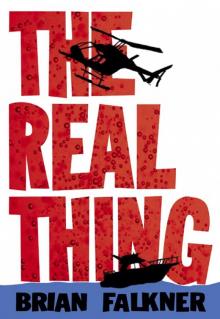 The Real Thing
The Real Thing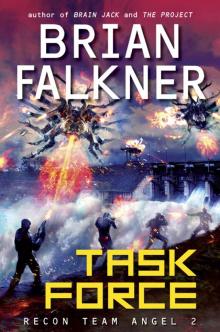 Task Force
Task Force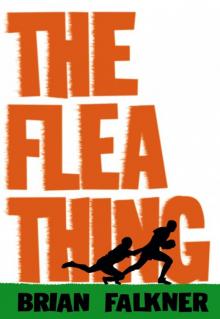 The Flea Thing
The Flea Thing The Project
The Project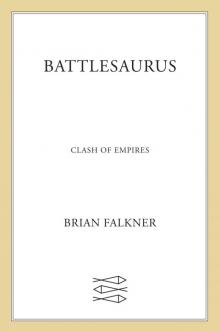 Clash of Empires
Clash of Empires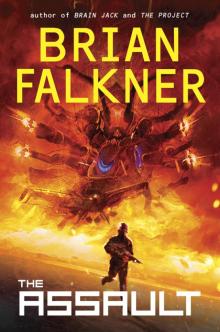 The Assault
The Assault Brain Jack
Brain Jack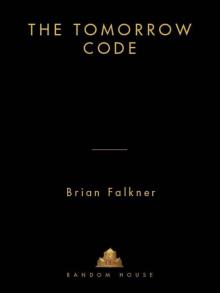 The Tomorrow Code
The Tomorrow Code Vengeance
Vengeance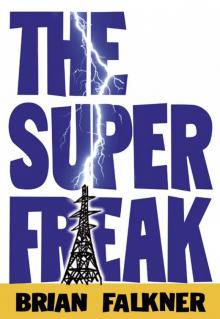 The Super Freak
The Super Freak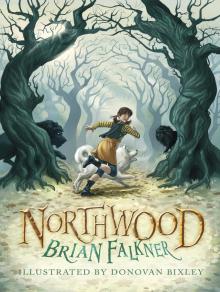 Northwood
Northwood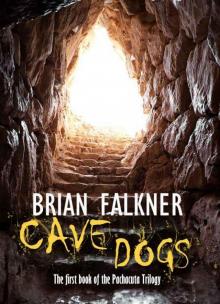 Cave Dogs (Pachacuta Book 1)
Cave Dogs (Pachacuta Book 1)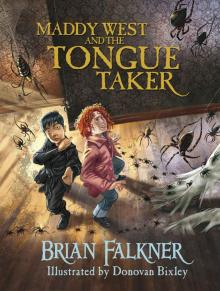 Maddy West and the Tongue Taker
Maddy West and the Tongue Taker